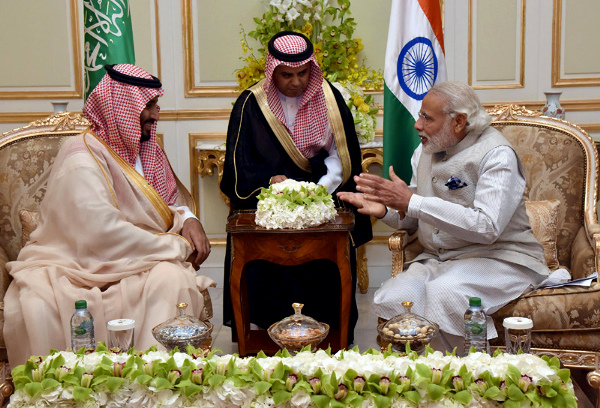Many Gulf countries especially the United Arab Emirates and Saudi Arabia have outlined their Vision plans for modernizing their economies and are looking at India as an important trading partner in a range of sectors including defence. Military-to-military relations and focus on maritime security is noteworthy, opines an international expert.
“In the defence sector, arms deals between India and the Gulf countries are limited, as India and the Gulf countries themselves are net importers of military systems that are still working to develop their defence industries. It is plausible that as these industries develop, the arms trade between India and the Gulf countries will grow, but it will be some time until this potential can be meaningfully realized,” opines US-based Derek Bisaccio, Military Markets Analyst for Forecast International.
India has secured some arms agreements with the Gulf countries, particularly the UAE, which, as far as the Gulf countries’ industries go, has the most advanced defence industry. “India’s Ordnance Factory Board (OFB) signed a deal with the UAE earlier this year to supply around $50 million in artillery shells to the Emirati military, which follows another sale of artillery shells to the UAE a few years back. This is a drop in the bucket compared to the total volume of Emirati arms imports, however,” according to Bisaccio.
In his view the Gulf countries have large defence budgets that they can leverage to buy advanced systems from Western suppliers, meaning that the arms market for the Gulf is extremely competitive.
Even though the arms trade between these countries is limited, military-to-military relations have deepened, particularly in the area of maritime security. “The UAE and India held their first joint exercise with India, called Gulf Star 1, in March 2018, following Prime Minister Narendra Modi’s visit to the country earlier that year. Then, Qatar and India conducted a naval drill in March 2018 as well and this was followed by a joint naval drill with Oman in July 2018. The armies of India and Oman have been conducting joint training every two years since 2015,” he adds.
Saudi Arabia and India are to hold their first joint naval drill in 2020. The focus on naval security is noteworthy. “Just in the past year, a number of maritime security incidents have happened in the Persian Gulf and the Gulf of Oman, spurring an increasing focus on naval issues by the Gulf countries. India has deployed warships to the area to ensure the security of Indian shipping vessels after the sabotage of several oil tankers near the Strait of Hormuz.”
Over the last few years, especially since King Salman took over in 2015, the Kingdom has expanded its regional presence dramatically. The operation in Yemen has been a large undertaking and to support it, Saudi Arabia has looked to establish foreign bases, such as in Djibouti. The base deployments reveal a broader Saudi security focus on the Indian Ocean region more widely, rather than just simply the Arabian Peninsula. The Saudi Navy is procuring new warships as it increasingly looks to naval issues as potential threats to its domestic security. “As part of this build-up, it is natural for Saudi Arabia to also look to develop its partnerships with the key players in the Indian Ocean region, one of whom is India. The Kingdom also has long-standing ties to Pakistan, and it appears Saudi Arabia wants to maintain warm ties with both countries,” the expert observes.
To a question on the pending procurement of Carbines from an Emirati company, Bisaccio says, “India is considering buying around 100,000 CAR 816 carbines, which are produced by Caracal International, an Emirati-based firm. The rifles have reportedly been used during the UAE’s campaign in Yemen, which, together with the export agreements, would indicate it is reliable. The sale, if completed, is positive for the UAE as it looks to turn its defence industry into a hub for arms exports to the wider region. In terms of deals between the UAE and India, this is a small step, but could demonstrate Indian confidence in Emirati products.”
On Kuwait, he says that the government of that country has typically tried to pursue a neutral foreign policy in the region, so that includes outreach to both India and Pakistan. With India, Kuwait has also conducted some joint drills and has hosted Indian warships earlier this year. “The country is part of the Gulf Cooperation Council but also maintains friendly ties to Iran. Unlike Saudi Arabia and the UAE, Kuwait is not seeking to develop an armaments industry, so the scope of defence trade cooperation with foreign countries is limited to the import of arms. On that subject, Kuwait has typically preferred to buy advanced equipment from Western suppliers (the US and European Union countries), without only limited interest in buying from regional suppliers,” he adds.
Moreover, Kuwait has not engaged in the same degree of arms trade politics as some of its neighbours who are more prone to ink large agreements with foreign suppliers for political reasons rather than military necessity.
Source: FE
Image Courtesy: PIB
You may also like
-
IAF Aircraft Set Course For Exercise Eastern Bridge VII At Oman
-
IAF Set To Host The Indian Defence Aviation Exposition-II At Jodhpur
-
Defence Secretary to co-chair 5th India-Philippines Joint Defence Cooperation Committee meeting in Manila
-
Simultaneous Launch Of ‘malpe And Mulki’, Fourth And Fifth Ships Of Asw Swc (Csl) Project
-
Aatmanirbharta in Defence: MoD signs Contract with HAL for 240 AL-31FP Aero Engines for Su-30MKI Aircraft
